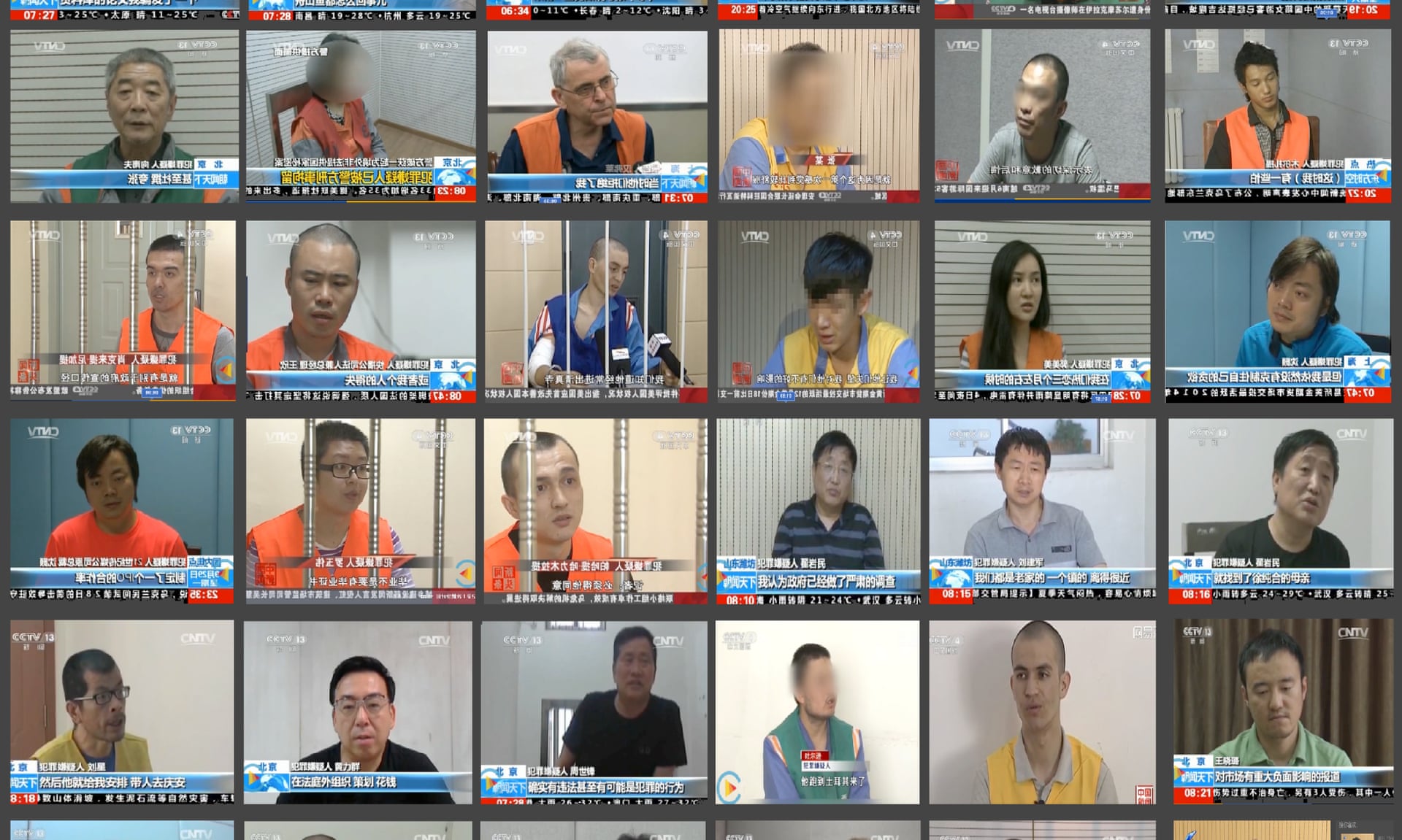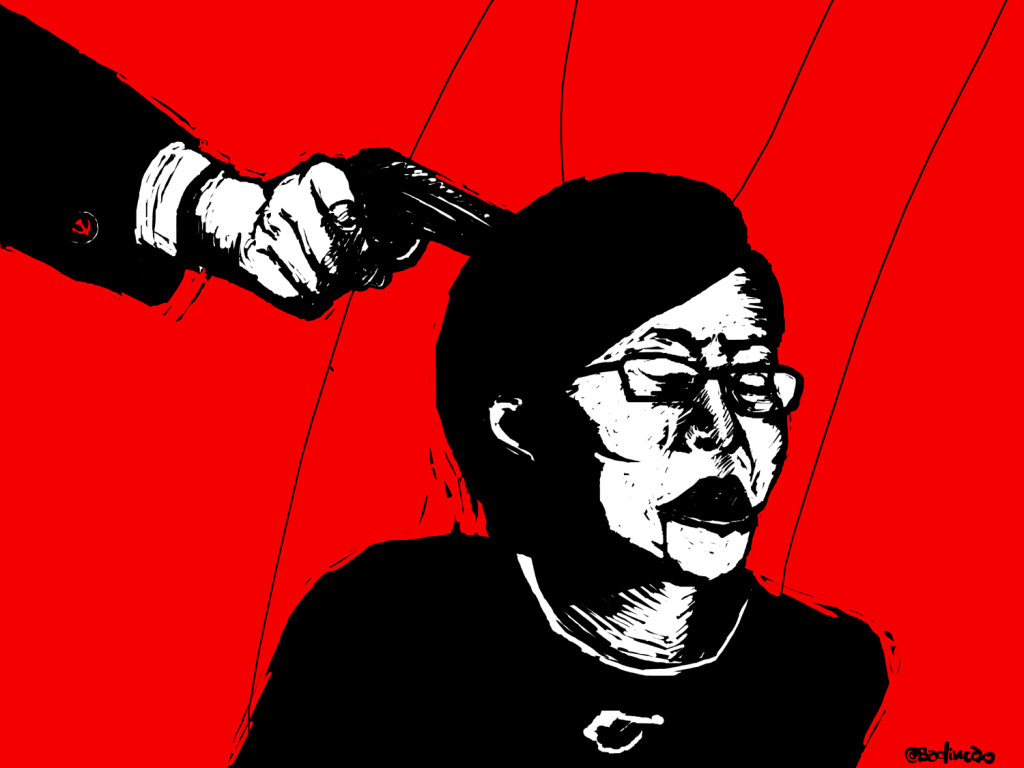The Guardian
Chinese courts have a conviction rate over 99% and cases rely heavily on confessions.
China must stop airing forced confessions from human rights activists, a campaign group has said in a report that details how detainees are coerced into delivering scripted remarks.
There have been at least 45 forced televised confessions in China since 2013, according to the report from Safeguard Defenders, a human rights NGO in Asia.
The group called on the international community to put pressure on the Chinese government to end the practice and recommended imposing sanctions on executives at China’s state broadcaster, including asset freezes and travel bans.
Those coerced into confessing describe being dressed by police and handed a script they are required to memorise, and even being given directions on how to deliver certain lines or cry on cue, the report says.
Those coerced into confessing describe being dressed by police and handed a script they are required to memorise, and even being given directions on how to deliver certain lines or cry on cue, the report says.
One person described enduring seven hours of recording for a television piece that ultimately amounted to several minutes.
Others reported police ordering retakes of confessions they were unhappy with.
Some occur in jailhouse settings, with the accused wearing an orange prison vest and sometimes seated behind bars, while others are made to look more neutral.
Some occur in jailhouse settings, with the accused wearing an orange prison vest and sometimes seated behind bars, while others are made to look more neutral.
The confessions are almost always aired before a formal conviction, violating Chinese law asserting a presumption of innocence.
Chinese courts have a conviction rate over 99% and cases rely heavily on confessions.
Chinese courts have a conviction rate over 99% and cases rely heavily on confessions.
Five of the 37 people described in the report who have confessed on Chinese television have since publicly retracted their confessions.
Since Xi Jinping came to power in 2012 there has been a wholesale crackdown on civil society and dissent, leading to hundreds of arrests targeting human rights activists and the lawyers that defend them.
Since Xi Jinping came to power in 2012 there has been a wholesale crackdown on civil society and dissent, leading to hundreds of arrests targeting human rights activists and the lawyers that defend them.
The practice of forced confessions was especially prominent during the 1966-76 Cultural Revolution, a decade of political upheaval during which “counter-revolutionaries” were paraded through the streets and forced to confess to their alleged crimes.
“[The police] threatened that if I did not cooperate with them they would sentence me to jail time, I’d lose my job, my family would leave me and I’d lose my reputation for the rest of my life,” said one person quoted in the report, identified only as Li.
“[The police] threatened that if I did not cooperate with them they would sentence me to jail time, I’d lose my job, my family would leave me and I’d lose my reputation for the rest of my life,” said one person quoted in the report, identified only as Li.
“I was only 39 years old, my hair turned white with the enormous pressure and torture of it all.”
Peter Dahlin, a former China-based NGO worker from Sweden, was forced to say he had violated Chinese law in a televised confession in 2016.
He said the purpose, especially when foreigners were involved, was to shape the conversation from the beginning and preempt any international criticism.
“This goes to show this is not done simply by police for murky propaganda purposes but directly by the state as a part of foreign policy,” he said.
Confessions by a range of suspects have been aired on China Central Television, the nation’s official broadcaster, including those by a British corporate investigator, a Chinese-born Swedish book publisher and dozens of Chinese activists who agitated for change.
Gui Minhai, the bookseller, has been paraded in front of media outlets on three separate occasions. He went missing from his apartment in a Thai resort town in late 2015 only to reappear months later in a Chinese jail, confessing to a traffic incident from 2003.
“These ‘confessions’ are about the crushing of dissent wherever it may arise,” David Bandurski, a researcher at the University of Hong Kong’s China Media Project, said in a conversation on the website China File last year.
“This goes to show this is not done simply by police for murky propaganda purposes but directly by the state as a part of foreign policy,” he said.
Confessions by a range of suspects have been aired on China Central Television, the nation’s official broadcaster, including those by a British corporate investigator, a Chinese-born Swedish book publisher and dozens of Chinese activists who agitated for change.
Gui Minhai, the bookseller, has been paraded in front of media outlets on three separate occasions. He went missing from his apartment in a Thai resort town in late 2015 only to reappear months later in a Chinese jail, confessing to a traffic incident from 2003.
“These ‘confessions’ are about the crushing of dissent wherever it may arise,” David Bandurski, a researcher at the University of Hong Kong’s China Media Project, said in a conversation on the website China File last year.
“The supposed crimes are of middling importance relative to the act of submission itself, the knuckling under to authority. In a word, then, this is political bullying.
“As Xi Jinping trumpets the principle of rule of law, these clearly forced admissions telegraph exactly the opposite message.”
“As Xi Jinping trumpets the principle of rule of law, these clearly forced admissions telegraph exactly the opposite message.”

